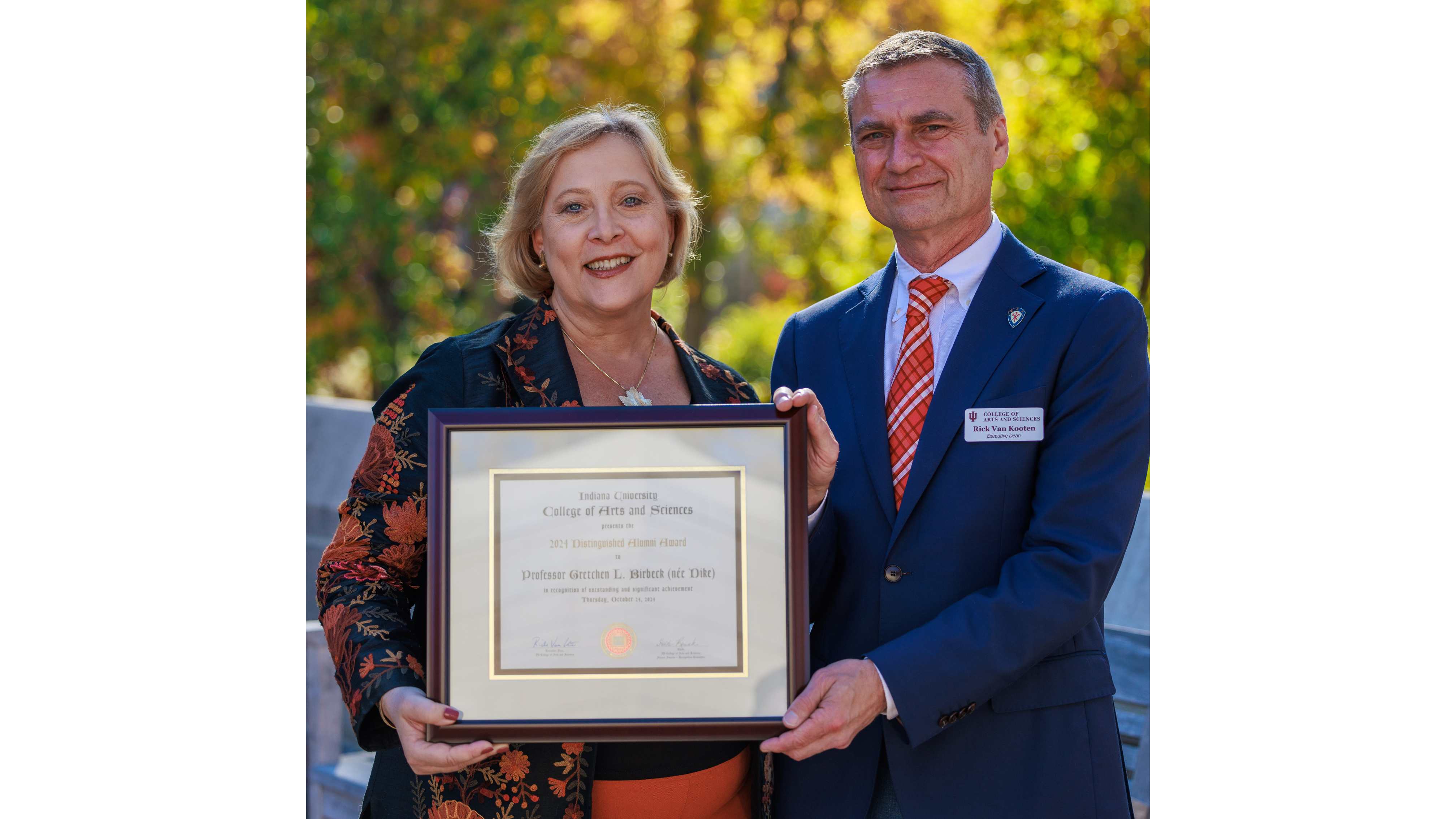On October 24, a ceremony at Alumni Hall recognized four IU College of Arts and Sciences Alumni Award recipients. Among them was Distinguished Alumna Gretchen Birbeck (B.A. ’90 Chemistry and Psychology).
Birbeck is the Rykenboer Professor of Neurology at the University of Rochester. She spends six months each year in Lusaka, Zambia, where she conducts research and provides medical care for people with epilepsy and other neurological problems arising from malaria, HIV, COVID and other infectious diseases.
During a question-and-answer session at the event, a junior faculty member asked for some advice: How does she convey the value of a liberal arts experience to her students? Birbeck’s answer was telling:
“Sometimes the best way to teach is by example. There might be some comfort in keeping students at a little bit of distance, but if we have a joyous professional life that’s founded upon a liberal arts education, founded on being a more diverse person and having more diverse interests, letting them see that can sometimes go a long way.”
A wide-ranging view
Birbeck’s diverse interests are evident early in her career. She was a second-year medical student at the University of Chicago, when she first considered working in southern Africa: “I had no plans to do international work. But as I was looking for a career path, I came to appreciate that most of humanity does not have MRI scanners down the hall, and I wanted to know how to care for patients without access to all this technology. I ended up in Zambia that year from curiosity.”
As both a doctor and scientist, her perspective broadened to include the social, cultural, economic and psychological factors impacting her patients. She learned how people with epilepsy in southern Africa deal with a social stigma that leads to poverty and isolation; how their daily lives, in which they cook over open fires and get their water from lakes and rivers, make them prone to severe burns and drowning when they have seizures; how women with epilepsy, often abandoned by their families, face increased risk of rape with potentially fatal consequences in a society where 25-29 percent of 15- to 49-year-olds are HIV positive.
Solving such a broad set of issues requires a broad set of skills, from developing trust and community partnerships, understanding traditional healing practices in Zambian culture, advocating for education and employment opportunities, improving housing and environmental quality, and decreasing violence towards women.
IU influences
Birbeck attributes this kind of comprehensive vision to her liberal arts education in PBS and the IU College of Arts and Sciences. She recalls the two humanities courses on sexuality in her senior year:
“Going into medicine at a time when AIDS was exploding in the U.S. and Zambia, these courses were incredibly helpful for thinking about sexuality for my entire life, but strangely enough were not the kind of courses I would have had as a scientist.”
She also remembers a PBS course from her junior year that still informs her teaching and research co-taught by Professor Emeritus Joe Steinmetz and Professor Dale Sengelaub.
“I knew I wanted to do medicine – from infancy probably,” said Birbeck. “But what happened here was that they didn’t just tell us what to learn; they told us how we got that bit of knowledge in the first place. And the idea that you could do something that generated new insights into the phenomena we were studying lit me on fire.”
These experiences, said Birbeck, are made possible by a large and varied campus like IU, “where you can find a small community that can really speak to you and turn your life into a pursuit of knowledge. Thank you, Joe and Dale.”
As Sengelaub, who was in the audience, confirmed, that memorable class was the Laboratory for Behavioral Neuroscience which he co-taught in the spring of 1989, with Steinmetz. He vividly remembers Birbeck: “She really stood out. It was 34 years ago, but if you had talked to her for more than 30 seconds you could see that she had this combination of insouciance and curiosity that was just different.”
His comments are well-supported by Steinmetz, who similarly remembers Birbeck “as one of the future superstars among his many talented students, smart, highly motivated, quick to pick up research skills, as well as a delight to be around.”
An international career
Birbeck attributes the path of career to her sense of curiosity along with the recognition of “a little voice in me saying, ‘This is actually where you need to be.’” It drew her on to an international career on two continents, transformative research and improvements to health services in southern Africa now recognized throughout the world. As she demonstrates to her students, that is where a life founded on a liberal arts education can lead.
In addition to her position at the University of Rochester, Birbeck holds a faculty position at Zambia’s University Teaching Hospitals and serves as director of the Chikankata Epilepsy Care Team. She has been an advisor to the World Health Organization, the World Bank, and the Gates Foundation, and a mentor to young scientists from the U.S., Zambia and Malawi.



 The College of Arts
The College of Arts